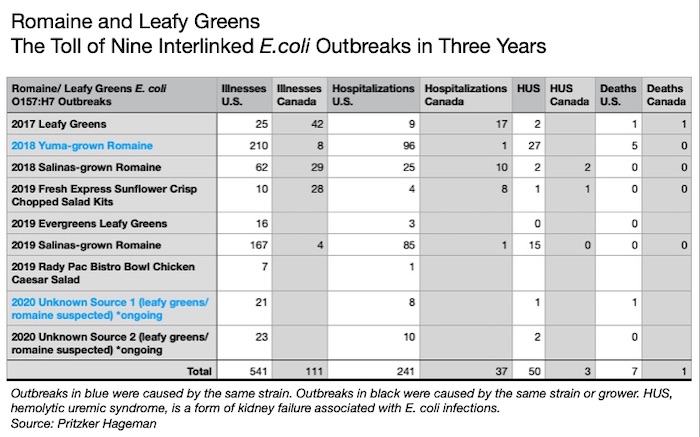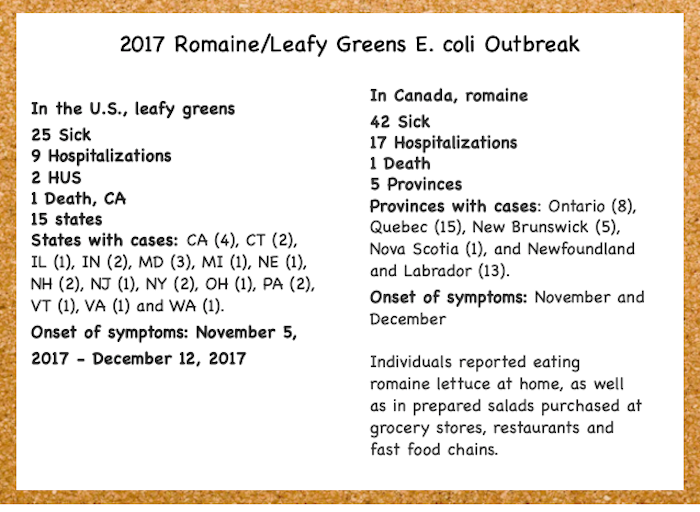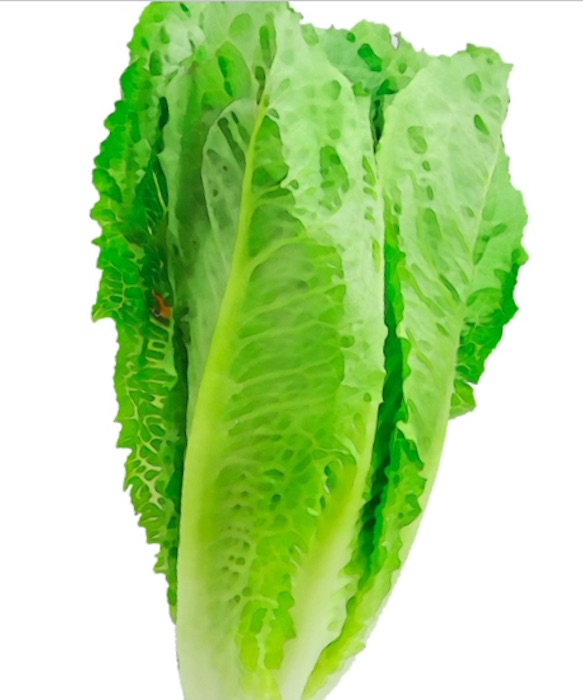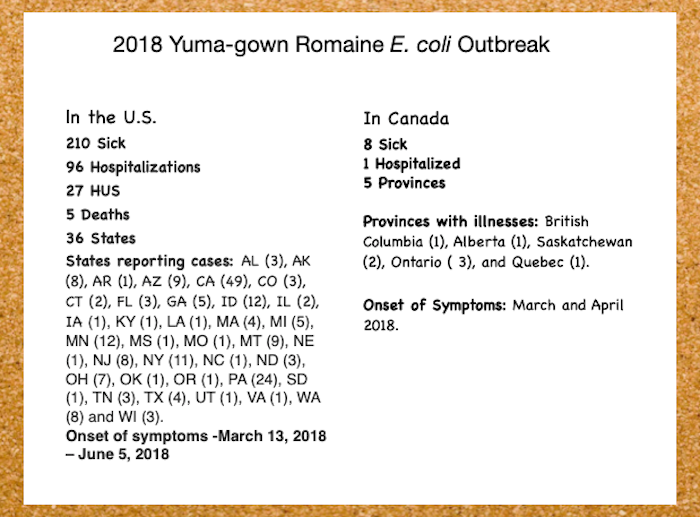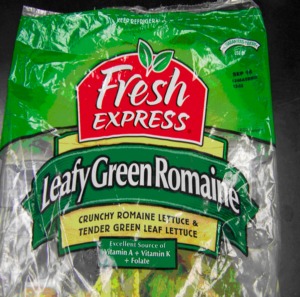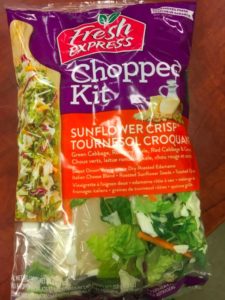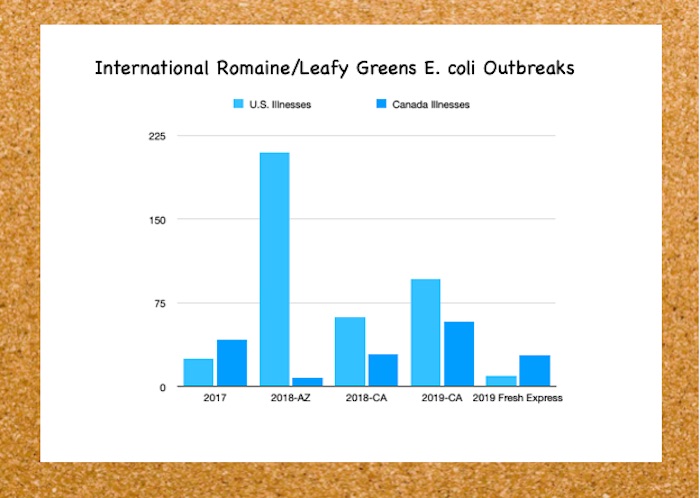Three days ago, the Centers for Disease Control and Prevention (CDC) announced two E. coli O157:H7 outbreaks that have, so far, sickened a total of 44 people, killing one of them. Investigators are still working to confirm a food source, but some type of leafy greens, most likely romaine, are suspected in both. This is based on food histories of those sickened and genetic tests of the E. coli strains, each one closely resembling a strain linked to a previous romaine E. coli outbreak, or outbreaks. These aren’t the only outbreaks that are linked.
In fact, nine E. coli outbreaks since 2017 share either the same strain, the same romaine lettuce grower or both. That’s multiple links among nine outbreaks in the last three years.
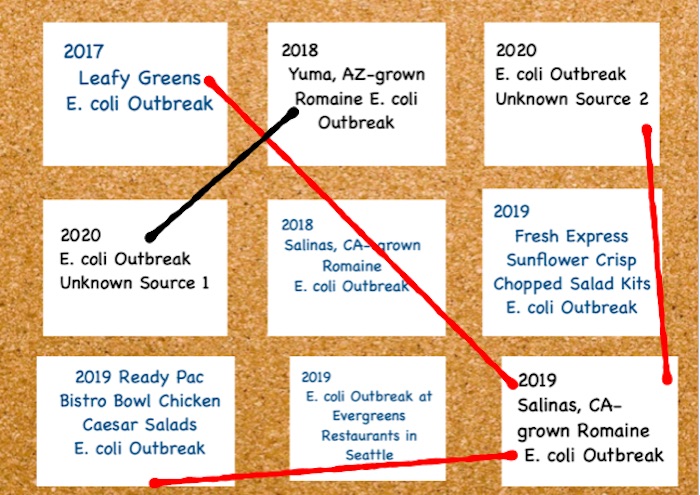
Before we take a look at key events in the timeline of all nine outbreaks, some key facts.
Where Does E. coli O157: H7 Come From?
The E. coli serotype E. coli O157: H7 was discovered in 1982. It is among a small group of E. coli serotypes that produces a kind of poison called a Shiga toxin which, in humans, can cause a type of kidney failure called hemolytic uremic syndrome (HUS), other severe illnesses and death. E. coli O157: H7 live in the intestines of ruminant animals, cattle are the primary reservoir.
Arizona and California Grow Almost All the Lettuce in U.S.

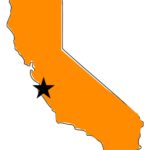
Arizona and California grow 90 percent of the nation’s leafy greens, dividing the year between them. In November, production transitions to Arizona. In April, it shifts back to California. Each state has several growing regions, the areas linked to these outbreaks are Yuma, AZ and Salinas, CA.
E. coli Outbreaks Linked to Leafy Greens are Common
In the U.S., 40 E. coli outbreaks were linked to leafy greens between 2009 and 2018, according to the CDC. Together, those outbreaks resulted in 1,212 illnesses, 420 hospitalizations, 77 cases of HUS and eight deaths. Two of the nine interlinked outbreaks are ongoing, but so far these nine outbreaks have resulted in 541 illnesses, 241 hospitalizations, 50 cases of HUS and seven deaths in the U.S. Some of the outbreaks caused illnesses in Canada, too, which is why their government laid down a set of strict import rules on all romaine lettuce shipments originating from Salinas arriving in Canada from October 7, 2020 to December 31, 2020. These rules include required proof of origin and product testing. Our regulatory agency, the U.S. Food and Drug Administration (FDA), has made suggested modifications instead of required changes.
Leafy Greens and Romaine E. coli Outbreaks, 3-Year Timeline
2017 Leafy Greens E. coli Outbreak
December 11, 2017 – Public Health Agency Canada (PHAC) announces an E. coli outbreak in three provinces linked to romaine lettuce. The CDC begins an investigation of five illnesses in the U.S.
December 20, 2017 – Whole Genome Sequencing (WGS) confirms that the U.S. cases have the same E. coli fingerprint as the Canadian outbreak. One of four people interviewed says they ate romaine lettuce in the week before becoming ill.
December 28, 2017 Leafy Greens E. coli Outbreak announced in U.S.
17 Sick
13 States
States with cases: California (3), Connecticut (2), Illinois (1), Indiana (1), Michigan (1), Nebraska (1), New Hampshire (2), New York (1), Ohio (1), Pennsylvania (1), Virginia (1), Vermont (1) and Washington (1).
Onset of symptoms: November 15, 2017 – December 8, 2017
- A specific source is not identified.
- Thirteen people have been interviewed, all say they ate some type of leafy green.
- 56 percent specified romaine which only 10 percent higher than non-outbreak interviews.
- People reported eating different types and brands of romaine.
January 10, 2018 – PHAC says the Canadian outbreak has ended with 42 illnesses, 17 hospitalizations and one death. The people sickened reported eating romaine at home in in prepared salads they purchased at grocery stores, restaurants and fast-food chains. The U.S. outbreak grows to include 24 illnesses in 15 states
January 25, 2018 – Leafy Greens Outbreak Ends
25 Sick
9 Hospitalizations
2 HUS
1 Death, CA
15 states
States with cases: CA (4), CT (2), IL (1), IN (2), MD (3), MI (1), NE (1), NH (2), NJ (1), NY (2), OH (1), PA (2), VT (1), VA (1) and WA (1).
Onset of symptoms: November 5, 2017 -December 12, 2017
- Fifteen of the people interviewed say they ate leafy greens, 55 percent specify romaine.
- No other food items are identified.
- FDA determined that the romaine originated from multiple farms in Arizona, California and Mexico.
- In Canada, the outbreak linked to romaine contaminated with the same strain ends with 42 illnesses, 17 hospitalizations and one death. They reported onset of symptoms on dates ranging from November 16, 2017, to December 12, 2017. The provinces reporting illnesses were: Ontario (8), Quebec (15), New Brunswick (5), Nova Scotia (1) and Newfoundland and Labrador (13).
Yuma, AZ-grown Romaine E. coli Outbreak
April 4, 2018 – FDA learns about a cluster of E. coli O157:H7 illnesses.
April 10, 2018 – Yuma, AZ-grown Romaine E. coli outbreak announced
17 sick
6 hospitalized
1 HUS
7 states
States with cases: CT(2), ID (4), MO (1), NJ (6), OH (1), PA(2), WA (1)
Onset of symptoms: March 22, 2018 – March 31, 2018
- The outbreak is discovered using PulseNet, a national subtyping database managed by the CDC.
- No food item is identified.
April 13, 2018 – CDC publishes and outbreak update
35 Sick
22 hospitalized
3 HUS
- Leafy greens are identified as the source.
- Most people reported eating a salad at a restaurant, chopped romaine is a common ingredient.
- No restaurants are named.
April 16, 2018 – Yuma growing season ends. Although it is in the midst of an investigation tracing back the lettuce to the farm(s) where it was grown, FDA states later that it did not receive confirmation that the season had ended until May 2, 2018.
April 18, 2018 – CDC publishes an outbreak update.
53 Sick
31 Hospitalized
5 HUS
16 states
-
- 41 of 43 people sickened ate romaine in the week before they became ill.
- Most said they ate it at a restaurant, the restaurant name is not disclosed.
April 20, 2018 – CDC publishes an outbreak update.
- An E. coli outbreak at a correctional facility outbreak sickens eight prisoners.
- The outbreak is linked to whole romaine lettuce from Yuma.
April 25, 2018 – CDC publishes an outbreak update.
84 sick
42 hospitalized
9 HUS
19 states
- 67 people have been interviewed, 61 of them said they ate romaine before they became ill.
April 27, 2018 – CDC publishes an outbreak update.
98 Sick
46 Hospitalizations
10 HUS
22 States
May 2, 2018 – CDC publishes an outbreak update.
121 Sick
52 Hospitalizations
14 HUS
1 Death
25 states
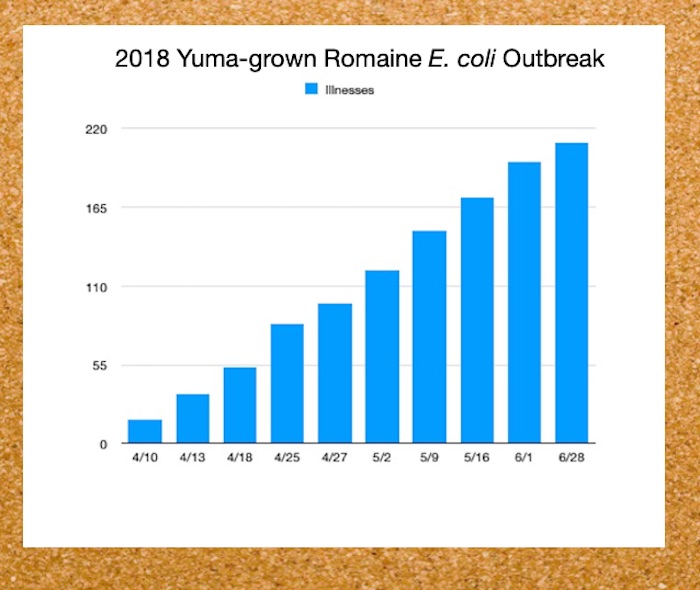
May 9, 2018 – CDC publishes an outbreak update.
149 Sick
64 Hospitalizations
17 HUS
1 Death
29 States
Six cases in Canada linked to Yuma-grown romaine.
May 16, 2018 – CDC publishes an outbreak update.
172 Sick
75 Hospitalizations
20 HUS
1 Death
32 States
- Lettuce linked to the outbreak was harvested on April 16, 2018, and the harvest season is over.
- Given its 21-day shelf life, CDC believes it is unlikely that any romaine lettuce from the Yuma growing region is still available in people’s homes, stores, or restaurants.
June 1, 2018 – CDC publishes an outbreak update.
197 Sick
89 Hospitalizations
26 HUS
5 Deaths
- Most people reported eating romaine, some didn’t but had contact with those who did.
- FDA to conduct environmental sampling in Yuma growing regions June 4 – June 8.
June 22, 2018 – PHAC declares an end to its outbreak. Eight people from five provinces were sickened. One person was hospitalized. All of the people who became sick reported that they ate romaine lettuce at home, or in prepared salads they purchased at grocery stores, restaurants and fast food chains, in the days before they became ill. The names of these establishments are not released.
June 28, 2018 – Yuma, AZ Grown Romaine E. coli Outbreak Ends
210 Sick
96 Hospitalizations
27 HUS
5 Deaths
36 States
States reporting cases: AL (3), AK (8), AR (1), AZ (9), CA (49), CO (3), CT (2), FL (3), GA (5), ID (12), IL (2), IA (1), KY (1), LA (1), MA (4), MI (5), MN (12), MS (1), MO (1), MT (9), NE (1), NJ (8), NY (11), NC (1), ND (3), OH (7), OK (1), OR (1), PA (24), SD (1), TN (3), TX (4), UT (1), VA (1), WA (8) and WI (3).
Onset of symptoms -March 13, 2018 – June 5, 2018
- CDC laboratory testing identified the outbreak strain of E. coli O157:H7 in canal water samples taken from the Yuma growing region
- No products are recalled.
- In Canada, eight people from five provinces were sickened. One person was hospitalized.
- People who became sick reported that before they became ill they ate romaine lettuce at home, or in prepared salads they purchased at grocery stores, restaurants and fast food chains.
- None of the names of these establishments was released.
November 1, 2018 – FDA releases a report of its environmental assessments of the Yuma-grown Romaine E. coli Outbreak.
Salinas-grown Romaine E. coli Outbreak 2018
November 20, 2018 – Salinas-grown Romaine E. coli Outbreak 2018 announced
32 Sick
13 Hospitalized
1 HUS
11 States
States with cases: CA (12), CT (1), DC(2), FL (1), GA (1), IL (2), LA (1), MA (1), MD (1), MI (7), NH(6) NJ (13)
Onset of symptoms: October 8, 2018, to October 31, 2018
- CDC warns consumers, restaurants and retailers to throw away all romaine lettuce.
- Genetic analysis reveals the outbreak strain of E. coli O157:H7 is the same as the leafy greens outbreak in the Fall of 2017.
- United Fresh Produce Association and the Leafy Greens Marketing Agreement issued statements committing to withdraw the potentially contained romaine from the market. (Note: The growing season ends in November.)
- 11 of 14 patients interviewed reported eating romaine at home and at restaurants before they became ill. The names of the restaurants are not released.
November 23, 2018 – FDA, CDC and state health officials began conducting on-site investigations of farms and lettuce cooling facilities in California that have been identified by traceback investigations.
November 26, 2018 – CDC publishes an outbreak update.
43 Sick
16 Hospitalized
1 HUS
12 states
December 6, 2018 – CDC publishes an outbreak update.
52 Sick
19 hospitalized
2 HUS
15 states
- FDA says traceback information from four restaurants in three different states so far has implicated 10 different distributors, 12 different growers, and 11 different farms as potential sources of the contaminated lettuce.
- The agency says this information indicates that the outbreak cannot be explained by a single farm, grower, harvester, or distributor.
December 13, 2018 – CDC publishes an outbreak update.
59 Sick
23 Hospitalized
2 HUS
15 States
- FDA finds the outbreak strain of E. coli O157:H7 in one sample collected in the sediment of an agricultural water reservoir at one ranch owned and operated by Adam Bros. Farming, Inc., in Santa Barbara County.
- Adam Bros is one of the eight farms identified in the traceback.
- The finding does not explain all illnesses.
- Adam Bros. Farming, Inc., in Santa Barbara County, issues recall.red leaf lettuce, green leaf lettuce and cauliflower harvested on November 27 through 30, 2018. According to the firm, the lettuce and cauliflower was distributed to wholesalers in the U.S. Mexico, and Canada.
- The recalled products that may have come into contact with water from the water reservoir where the outbreak strain was found.
December 17, 2018 – Spokane Produce Inc. of Spokane, WA, a wholesaler, issues a recall for sandwiches and other products under the Northwest Cuisine Creations and Fresh&Local labels.
December 24, 2018 – PHAC says the outbreak in Canada has ended.
January 9, 2019 – 2018 Salinas-grown Romaine E. coli Outbreak ends
62 Sick
25 Hospitalized
2 HUS
16 States
States with Cases: CA (12), CT (1), DC (1), FL (1), GA (1), IL (2), LA (1), MA (1), MD (1), MI (7), NH (6), NJ (13), NY (7), OH (1), PA (5), RI (1), WI (1)
Onset of symptoms: October 7, 2018, to December 4, 2018
In Canada, 29 illnesses, 10 hospitalizations and two cases of HUS were reported from four provinces: Ontario (5), Quebec (20), New Brunswick (1), and British Columbia (3).
February 3, 2019 – FDA releases an investigation summary of 2018 Salinas-grown Romaine E. coli Outbreak. One of the agency’s recommendations is to encourage the leafy greens industry to adopt traceability best practices and state-of-the-art technology.
October 31, 2019 – After-the-Fact Likely Romaine from Central Coast CA E. coli Outbreak is announced. NOTE: This outbreak is not one of the nine interlinked outbreaks, but it occurred between two of them.
23 sick, 11 hospitalized, 12 states – Onset July 12, 2019, to September 8, 2019.
Arizona (3), California (8), Florida (1), Georgia (1), Illinois (2), Maryland (1), North Carolina (1), Nevada (1), New York (1), Oregon (1), Pennsylvania (2) and South Carolina (1).
Federal health officials did not announce this outbreak until it was over. The CDC told FDA about the illnesses in mid-Sept. FDA collected and tested environmental samples from farms in the Salinas Valley that did not identify the outbreak strain.
Ready Pac Bistro Bowl Chicken Caesar Salad E. coli Outbreak
November 18, 2019 – Ready Pac Bistro Bowl Chicken Caesar Salad E. coli Outbreak in MD announced
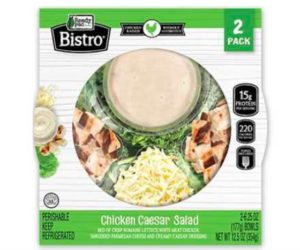
1 Hospitalized
1 state
Onset of illnesses dates not published
- Product was sold at Sam’s Club in Maryland
- Maryland health officials say all of the patients ate these salads, purchased from multiple Sam’s Club locations, before they became ill.
- Tests on an unopened salad from one patient’s home found the outbreak strain E. coli O157: H7 in the romaine lettuce.
2019 Salinas-grown Romaine E. coli Outbreak 2019
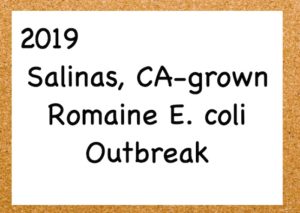
17 sick
7 hospitalized
2 HUS
11 States
Cases reported from each state AZ (1), CA (2), CO (1), ID (3), MD(2), MT (1) WA (1) WI (6)
- Some illnesses from the Ready Pac Chicken Caesar E. coli Outbreak in Maryland are determined to be part of a larger outbreak including illness in 10 other states
- People in other states did not report eating Ready Pac Foods Bistro® Chicken Caesar Salad.
- The FDA determines the romaine in the Ready Pac Chicken Caesar salads originated from farms in Salinas, CA.
- Genetic tests reveal the outbreak strain is the same one linked to the 2017 Leafy Greens E. coli outbreak and the 2018 California-grown Romaine E. coli outbreak
Leafy Geens E. coli Outbreak at Evergreens Restaurants
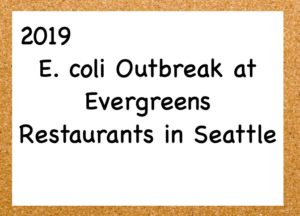
16 Sick
3 Hospitalized
Onset of illness: November 8, 2019 – November 11, 2019
- The outbreak strain does not match the strain associated with the 2019 Salinas-grown Romaine E. coli outbreak but it is later determined that the romaine came from a common grower.
November 21, 2019 – Missa Bay of Swedesboro, N.J. issues recall for salad products including Ready Pac Chicken Caesar
November 22, 2019 – Salinas-Grown Romaine E. coli Outbreak 2019 update
40 Sick
28 Hospitalized
5 HUS
16 States
- FDA determines the romaine linked to the outbreak is grown in Salinas, CA.
- FDA states genetic analysis shows “the E. coli O157:H7 strains from patients in this current outbreak are similar to strains of E. coli O157:H7 associated with a previous outbreak from the Fall of 2017 and the Fall of 2018 that affected consumers in both Canada and the U.S. The 2017 outbreak of E. coli O157:H7 was associated with leafy greens in the U.S. and romaine in Canada. The 2018 outbreak of E. coli O157:H7 was associated with romaine in both countries.”
- FDA states that it is deploying investigators to farms in the Salinas Valley.
- CDC advises consumers not to eat any romaine lettuce grown in Salinas, CA and retailers and restaurants not to sell it.
- USDA FSIS issues Public Health Alert for products containing romaine lettuce from Salinas, CA for E. coli risk. FSIS warns against consuming any wraps, sandwiches, prepackaged salad, salad kits, or other product containing romaine lettuce harvested from the Salinas, California, growing region.
- Public Health Agency Canada Issues Public Health Advisory telling consumers to not eat, and retailers and foodservice establishments to not sell or serve, any romaine lettuce harvested from Salinas.
November 26, 2019 – Salinas-grown Romaine E. coli Outbreak update
67 Sick
39 Hospitalized
6 HUS
19 States
December 4, 2019 – Salinas-grown Romaine E. coli Outbreak update
102 Sick
58 Hospitalized
10 HUS
23 States
- FDA states that it has requested that the industry perform a voluntary withdrawal of romaine grown in Salinas from the market and “is requesting that industry withhold distribution of Salinas romaine for the remainder of the growing season in Salinas. This was the most efficient way to ensure that contaminated romaine was off the market.”
- Note: The growing season in Salinas ends in November.
- FDA states it has collected environmental, soil and water samples from Salinas farms and that state health investigators are testing samples of products.
- FDA states it is analyzing hundreds of distribution records.
December 6, 2019 – Salinas-Grown Romaine E. coli Outbreak update
-
-
- On December 6, 2019, Wisconsin health officials found E. coli O157 in an unopened bag of chopped Fresh Express® brand Leafy Green Romaine salad from Salinas, California that was collected from an ill person’s home.
- While E. coli O157 was found in a bag of chopped Fresh Express® brand romaine, not all ill people in Wisconsin included in this outbreak report eating Fresh Express® brand romaine.
- No single brand, product, or type of romaine lettuce has been reported by all ill individuals. The investigation is ongoing to determine the source of contamination and if additional products are linked to illness.
-
Fresh Express Sunflower Crisp Chopped Salad Kits E. coli Outbreak

8 Sick
3 Hospitalizations
1 HUS
-
-
- Health officials interviewed seven of the patients all of whom reported eating leafy greens before they became ill.
- Six of them said they ate Fresh Express Sunflower Crisp Chopped Salad kits.
- Different Strain than 2019 Salinas-grown Romaine E. coli Outbreak
- Public Health Agency of Canada also reported several illnesses that were closely related genetically to illnesses in the United States.
- Investigators have not yet determined where the romaine lettuce in the salad was grown.
-
December 12, 2019 – Salinas-grown Romaine E. coli Outbreak update
-
-
- FDA states that it is investigating three E. coli outbreaks linked to romaine lettuce grown in Salinas: the Salinas-grown Romaine E. coli Outbreak, the Fresh Express Sunflower Crisp Chopped Salad E. coli outbreak, and an E. coli outbreak linked to Evergreens restaurants in Washington state.
- Each of these outbreaks is linked to a different E. coli strain, but all of them have a common grower in Salinas.
-
December 13, 2019 – Salinas-grown Romaine E. coli Outbreak update
-
-
- WGS showed that the E. coli O157 strain found in the romaine matches the outbreak strain of E. coli that has made people in Wisconsin and other states sick.
- Some of these patients reported eating Fresh Express brand Leafy Green Romaine in the week before they became ill.
- Food Poisoning Lawyers Representing Wisconsin Teen with Kidney Failure from E.coli Infection
-
December 19, 2019 – Salinas-grown Romaine E. coli Outbreak 2019 update
138 Sick
72 Hospitalized
13 HUS
25 States
-
-
- FDA, CDC and state health departments are attempting to identify any factors that could have led to contamination at a common farm identified by traceback. This investigation involves assessing and sampling soil, animal droppings, compost and water.
- FDA updates the Wisconsin Department of Health Services’ finding of the outbreak strain of E. coli O157:H7 in an unopened bag of Fresh Express brand Leafy Green Romaine collected from an ill person’s home. One of the growers of romaine in this product also supplied romaine linked to other E. coli outbreaks that FDA is investigating.
-
January 15, 2020 – Salinas-grown Romaine E. coli Outbreak Ends
167 Sick
85 Hospitalizations
15 HUS
27 States
Cases reported from each state: AZ (4), CA (8), CO (6), DE (1), FL (4), IA (1), ID (4), IL (15), MD (5), MI (2), MN (7), MT (1), NE (2), NJ (9), NC (3), NM (2), NY (3), OH (12), OR (1), PA (21), SC (1), SD (1), TN (1), TX (6), VA (6), WA (6), WI (35)
Onset of symptoms:- September 20, 2019, to December 1, 2019
-
-
- The Salinas-grown Romaine E. coli Outbreak, the Fresh Express Sunflower Crisp Chopped Salad E. coli outbreak, and an E. coli outbreak linked to Evergreens restaurants in Washington state are each linked to a different E. coli strain, but all of them have a common grower in Salinas.
- FDA, CDC and state health officials end their investigation of the common grower associated with the romaine outbreak with cases in U.S. and Canada, the Evergreens outbreak in Washington state and the Fresh Express Sunflower Crisp Chopped Salad Kits outbreak with cases in the U.S. and Canada.
- FDA states the outbreak “strain of E. coli was determined to be of low risk to people.”
Note: About half of the people who got sick needed to be hospitalized, 15 of them had HUS, a form of kidney failure associated with E. coli infections, including one of our clients, a teenage girl in Wisconsin who developed HUS. - Soil sample results have come back negative for the three outbreak strains of E. coli.
- FDA states that although one grower was determined to be a common supplier for all three outbreaks based on available supply chain information, the romaine lettuce from this grower does not explain all of the illnesses seen in the three outbreaks.
- The FDA reveals that (surprise!) when investigators arrived at the ranch in question there was no romaine in the ground and the fields had been plowed as “the growing season had already ended.”
- Careful readers of this timeline will have noted the note in the 12/4/2019 entry stating that the growing season in Salinas ends in November and, therefore, the FDA’s approach to removing contaminated product from the market seemed unusual.
- As a refresher: the FDA requested that the industry perform a voluntary withdrawal of romaine grown in Salinas from the market and requested that the industry withhold distribution of Salinas romaine for the remainder of the growing season in Salinas. This was the most efficient way to ensure that contaminated romaine was off the market.”
- With the Salinas growing season over and no illnesses reported, the CDC says it is no longer advising people to avoid romaine lettuce grown in Salinas.
- Fresh Express did not issue a recall for Fresh Express® brand Leafy Green Romaine.
-
January 15, 2020 Fresh Express Sunflower Crisp Chopped Salad Kits E. coli Outbreak Ends
10 Sick
4 Hospitalized
1 HUS
5 States
Cases reported from: GA(1), IL(1), MN (5), ND(1), WI (3)
Onset of symptoms November 6 to November 16, 2019
-
-
- All 10 reported eating any leafy greens in the week before their illness started.
- Eight people specifically reported eating a Fresh Express Sunflower Crisp chopped salad kit.
Romaine lettuce was one of the ingredients in the salad kit, but the investigation was not able to determine if romaine lettuce was the contaminated ingredient in the salad kit. - Fresh Express did not issue a recall for Fresh Express Sunflower Crisp Chopped Salad kits.
- In Canada, 28 illnesses were reported from seven provinces: Manitoba (3), Ontario (11), Quebec (4), New Brunswick (4), Nova Scotia (4), Prince Edward Island (1), and Newfoundland and Labrador (1). Eight people were hospitalized, one with HUS. Onset of symptoms ranged from November 5 and December 10, 2019.
-
E. coli Outbreak with Unknown Source 1
October 28, 2020 – E. coli Outbreak with Unknown Source 1 announced
21 sick
8 hospitalizations
1 HUS
1 Death
8 states
States with cases: CA (7), FL, (1) IL(1), MI (2), NJ (1), OH (7), UT(1) and WI (1).
Onset of symptoms: June 6, 2020, to October 5, 2020
-
-
- The fatality was reported in Michigan.
- Health officials say they haven’t identified the product associated with the illness but romaine or other leafy greens are suspected.
- The outbreak strain of E. coli was also linked to the 2018 Yuma, AZ-grown Romaine Lettuce E. coli Outbreak.
- A cluster of illnesses is associated with a restaurant that has not been named.
-
E. coli Outbreak with Unknown Source 2
October 28, 2020 – E. coli Outbreak with Unknown Source 2 announced
23 sick
10 hospitalized
2 HUS
12 states
12 states reporting cases: CA (2), Il (1), KS(4), MI (2), MO (2), ND (4), OH (1), PA (2), TN (1), UT (1), WA (1) and WI (2).
Onset of symptoms: August 17, 2020, to October 8, 2020
-
-
- Health officials say they haven’t identified the product associated with the illness but romaine or other leafy greens are suspected.
- The fingerprint of the E. coli O157:H7 strain associated with this outbreak matches the strain linked to three outbreaks that occurred in 2019 linked to romaine lettuce grown in Salinas.
-
Multiple Links Among 9 Outbreaks in the Last 3 Years?
The FDA says there are a number of reasons why this keeps happening: Some of these growing areas are near land used for cattle grazing or feedlots. Runoff, from animal waste can contaminate water that produce growers use for irrigation; leafy greens are perishable and their limited lifespan leaves a narrow product-testing window; many of the outbreaks occurred as the growing season in one region was coming to a close and crops were no longer in the fields; poor record-keeping by growers; co-mingling of product by distributors and so on. But one thing that the FDA doesn’t mention is enforcement.
After each outbreak, the FDA releases a report of findings and proposes new voluntary measures the industry can take. “Unfortunately, proposed procedures and recommended actions do not protect consumers. Mandatory safety and tracking rules, effective testing and actual enforcement do,” said Food Safety Attorney Fred Pritzker. “These mandatory changes are long overdue.”
